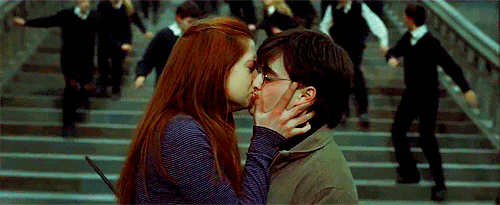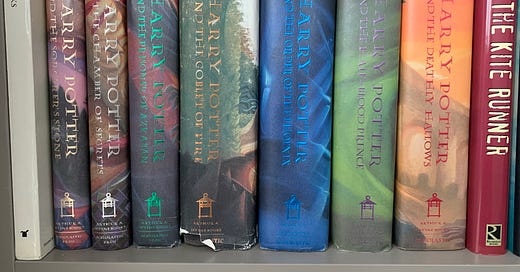Oy! Harry Potter spoilers ahead.
My sacred texts
Sob story
I’ve been re-reading all of the Harry Potter books since I came to Las Vegas ten weeks ago. I’m now more than halfway through Harry Potter and the Order of the Phoenix, the fifth of the seven books in the series. In between reading books about the adventures of a boy wizard, I’ve also read Jonathan Van Ness’s book Over the Top, Cat Marnell’s Self-Tanner for the Soul, and some of The Power of Now. But, mostly, I’ve been living at Hogwarts.
I know I’m not the only person taking this time to revisit the nostalgic escapes of childhood—or teenhood for me: I first picked up Sorcerer’s Stone when I was around 13. Throughout high school I attended book release parties with friends. I went to a midnight movie premiere and won the costume contest dressed as Hagrid—my magnificent fake beard perfectly matched my long, curly brown hair. During my senior year of high school I was the elected Secretary of Spirit; I planned all of the rallies during which each class would compete in games, like relay races around the gymnasium and cheer-offs. The school theme that year was Harry Potter so, naturally, I attended each rally dressed as Hagrid. No, I was not what you would call popular or cool. But I think I made people laugh. When Deathly Hallows came out in 2007, my friend Fran and I bought our books and read them sitting next to each other, in silence, for most of the next two days. We were 19.

My friend Shadi and myself, dressed as Hagrid, way back in high school
And so Harry Potter played a not-small part in my development as a person with values, someone who believed in the battle between good and evil, that love can be worth dying for. (I’m a Gryffindor sun, Ravenclaw rising.) I don’t have any tattoos, but from a young age I considered getting one that said “avada kedavra,” the killing spell, and the spell through which Harry is ultimately saved. I thought it would serve as a “carpe diem”-like reminder that some day I will die, so live today.
Reading these books again has been my most delicious quarantine activity. There’s a pristine leisure to deep-diving into this world at any time of day, usually from bed. My favorite part has been realizing how very much I have forgotten, even some giant plotlines. As I tear through each book, I’m titillated by what I discover. Percy Weasley is all but cut out from the movies, yet plays a much bigger part in the novels. And then there are the details I’m racking my brain to remember: I knew Barty Crouch Jr. escapes from Azkaban, the wizard prison, but couldn’t recall how; finally I discovered that his dad put his dying wife in his son’s place, then mind-controlled him for years with an illegal curse?! Damn. And when Dobby first visited Harry at the Dursley’s house in book two I was like, what’s this little dude up to again? Right now in book five, Kreacher is wandering around the Order’s headquarters, and I know he betrays everyone in an important way, but I can’t remember how. I don’t even remember exactly why Dumbledore trusts Snape so much, only that it has something to do with his love for Lily Potter. I can’t wait to find out.
What an absolute joy it is, in this particular instance, to have a flawed mind so susceptible to forgetting, only so I can experience something I love so deeply anew.
Something I didn’t understand as a teen is how important the theme of grief is to all of the novels. Harry has grieved his parents, who were murdered by Voldemort when he was a baby, his entire life; when he finally enters the wizarding world at 11 and learns more about how they lived and died, he grieves harder than ever. He gazes upon his overwhelming desire to see them alive in the Mirror of Erised. He is forced to relive the trauma of their deaths in his dreams when he has to hear his mother screaming, begging for his life to be saved, over and over and over. That memory, the worst of his life, comes to him when the dementors descend upon him.
Dementors, the rotting, skeletal guards of Azkaban, will suck your soul out of your body. But before they do, they force every bit of joy out of you and make you feel as though you’ll never be happy again. Reading about the dementors at this stage of my life, I find they compare neatly to depression, and the lack of control over my own emotions I’ve felt when I’ve been at my lowest. (I’ve read that J.K. Rowling suffered chronic depression throughout writing these books as a single mother, and was concurrently grieving the death of her mother.) To fight dementors, you have to conjure up the happiest memory you can before performing the Patronus spell to drive them away. (My patronus might be a lynx.) A common lesson in mental health is to practice gratitude, and focus on the things that bring you joy. But when you are depressed, those things can feel impossible.

Boggarts, on the other hand, are shapeshifters that show you what you are most afraid of. In Lupin’s Defense Against the Dark Arts class, Harry’s boggart turns into a dementor; when Molly Weasley later faces one, it turns into dead members of her family. I wonder what my boggart would show me.
Harry witnesses so much death and destruction in his young life. He’s raised in an abusive household and shown zero affection. He’s brutally teased and ostracized by many of his classmates. Two months after he sees Cedric die by Voldemort’s hand at the Triwizard Tournament, he’s back at school and acting like a total jerk to his friends. No wonder! This kid desperately needs therapy! Only once is grieving Cedric properly mentioned. Cho Chang, Cedric’s girlfriend at the time of his death, cries as she kisses Harry for the first time in the Room of Requirement; after, Hermione tells Harry about how often Cho’s been crying throughout the school term, how complicated her emotions are. I want to reach out and hug Cho and tell her she’s normal and no one expects her to be okay, to take all the time she needs to grieve.
Harry goes on to see his godfather die, then Dumbledore, Fred, Lupin, Tonks, and so many of his other friends and teachers. He is raised up through war. He internalizes that he himself may be bad, because Voldemort is bad, and a part of Voldemort literally lives inside of Harry. His ruminating made me think about how feelings are not facts: “Just because I feel bad doesn’t mean I am bad.” He experiences so much shame and self-doubt and mental and physical trauma. But no matter what happens to him (and how moody he is in books five and six—again, an obvious and expected response to internalized grief), he finds the strength to renew himself. He opens his heart over and over, falls in love, faces loss, shows his bravery, gets rightfully angry. I see parts of myself in his fictional struggle. I wish for him to find peace and happiness, to heal. I too wish to slumber in a four-poster bed in Gryffindor Tower, protected and comforted by powers greater than my own.

The books have prompted me to reconsider the grieving cycles in our lives, and how resilient and elastic we all are. The hedonic treadmill helps keep us alive. I have loved and lost several times. Each time, I felt like I could not possibly go through this pain again. But I did. And I always emerged different, smarter, more connected to myself, once more openhearted and willing to try again. My faulty memory, the same one that lets me re-experience these magical books, may make a fool of me sometimes, but it’s also among my strongest survival techniques. It lets me slowly forget and let go, so I can make room for what’s to come. I believe in love, and goodness, and I will fight for it. I’m forever a member of Dumbledore’s Army.
As Dumbledore once said: “It does not do to dwell on dreams and forget to live.”

More reading: Living through death with Harry Potter at the Atlantic
If you liked this newsletter, please subscribe and share:
Follow me on:
You are not alone!




